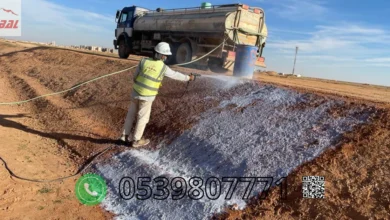
Chemical Soil Stabilization: The Optimal Solution for Improving Soil Properties
Chemical soil stabilization is considered one of the most effective methods used to improve soil properties and increase its load-bearing capacity for various engineering applications. This is achieved by adding special chemical agents that help enhance cohesion, reduce moisture absorption, and improve the soil’s resistance to loads, making it an ideal choice for infrastructure projects such as roads, foundations, and dams.
What is Chemical Soil Stabilization?
Chemical soil stabilization is a process in which chemical agents are used to enhance soil stability and improve its engineering performance. These agents alter the soil’s chemical composition, leading to increased strength and reduced susceptibility to swelling and shrinkage due to moisture variations.
Chemicals Used in Soil Stabilization
- Calcium Chloride (CaCl₂)
- Reduces soil moisture absorption.
- Improves soil resistance to erosion and harsh environmental conditions.
- Sodium Chloride (NaCl)
- Minimizes soil swelling and shrinkage.
- Enhances the stability of sandy and clay soils.
- Sodium Silicate (Na₂SiO₃)
- Provides additional strength and cohesion.
- Used in road and tunnel projects to increase soil load capacity.
- Chemical Polymers
- Includes acrylics and siliconates, which improve soil resistance to pressure and erosion.
- Commonly applied in large-scale construction projects requiring long-term soil enhancement.
- Lime and Fly Ash
- Improve the properties of plastic clay soils.
- Reduce soil moisture sensitivity.
Benefits of Chemical Soil Stabilization
✅ Increases soil load-bearing capacity, making it suitable for heavy foundations.
✅ Reduces moisture effects, minimizing expansion and shrinkage issues.
✅ Enhances soil erosion resistance, preventing land degradation.
✅ Lowers excavation and replacement needs, reducing construction costs.
✅ Extends infrastructure lifespan by improving soil stability beneath structures.
Applications of Chemical Soil Stabilization
- Roads and Airports: To strengthen soil beneath pavements.
- Foundation Support: To improve soil stability under buildings and bridges.
- Agricultural Projects: To prevent soil erosion and improve farmland stability.
- Dams and Reservoirs: To prevent water seepage through soil.
Conclusion
Chemical soil stabilization is one of the most important engineering solutions used to enhance soil performance and increase its stability. By choosing the right chemical agents and applying the technique correctly, significant improvements in soil strength and reduced environmental and construction risks can be achieved. Therefore, this technique is considered a valuable investment in modern infrastructure projects.
If you require advanced solutions in chemical soil stabilization, Jabal Contracting Company provides top-quality services to ensure the success of your projects at the highest engineering standards. 🚧🔬





